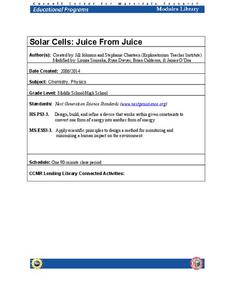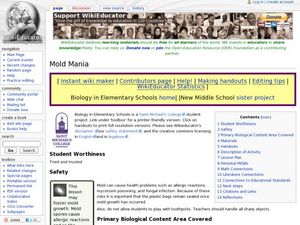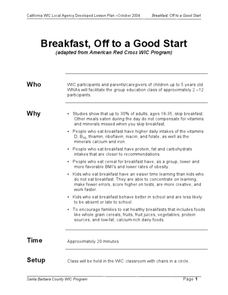Cornell University
Solar Cells: Juice From Juice
Unleash the power of ... blackberries! Science superstars create solar cells using the juice of berries or leaves of a citrus tree in an engaging lab. In addition to offering a plethora of resources, the teacher's guide gives background...
Agriculture in the Classroom
Seed Match
Using this resource, your team of green thumbs discuss why plants are a part of a healthy diet and the different ways they are used in daily life. They then observe the characteristics of different seed as they attempt to match them with...
Curated OER
Keep It Cool
Students complete a science experiment to study insulation, heat transfer, and permafrost. In this permafrost study lesson, students design and test a soda insulator. Students graph their class data and discuss the results. Students...
Curated OER
Divisibility Checks: Paired Activity
For this division game worksheet, students will work in small groups to play a game about dividing numbers. A teacher's guide with game instructions is included.
Curated OER
Exploring Decimals, Percents, and Fractions Using Gizmo
In this fraction, decimal, and percent worksheet, students convert between fractions, decimals, and percents. Students explore numbers presented in these different forms using models and Gizmo.
Curated OER
Lose the Fat, Keep the Vitamins... Drink Low fat Milk!
Students compare the different types of milk. In this adult health instructional activity, students examine the label and determine which is the healthiest. They discuss ways to switch from high fat to lower fat milk.
Curated OER
Investigation-How Far Can You Jump?
Students explore measurement. In this math instructional activity, students measure how far they can jump using blocks. Students compare the results when different sized blocks are used. Students estimate the distance jumped.
Curated OER
Plane and Solid Figures
Students define a plane and a solid shape. In this geometry lesson, students compare and contrast different geometric shapes as they relate to solids. They name the geometric solids based on their sides and edges.
Curated OER
Big Beans, Little Beans
Learners measure and note the variation in the lengths of lima beans. They compare the growth rate of different sized beans.
Curated OER
Finding the Area of Triangles
Twelfth graders apply the formula for finding the area of a triangle to various problems. They work real life problems for finding the area of a bathroom and the cost of tiling it. They play a game, Triangle Bingo, where they match...
Curated OER
Only 48 Hours
Students compare and contrast experiences of Les Aigner in Hungary and Kennie Namba in Oregon in being forced to relocate to concentration camps during WWII, and explore personal and social effects of prejudice, discrimination,...
Curated OER
Discovering Decimals
Pupils explore decimals. They use personal computers to compare decimal numbers and examine place value. Students participate in an animation game to complete decimal problems.
Curated OER
Is It Possible?
Students brainstorm ideas on how to a group of people could reach the highest together. In this possibilities lesson plan, students test their ideas and see how high they can reach.
Curated OER
Math, Chemistry, and Food
Students explore the effects of chemical reactions when cooking. Using the Internet, they research enzymes and then mix jello. They examine their results and test enzyme activity by adding pineapple to the jello. Finally, they test...
Curated OER
Primary Biological Content Area Covered
Students use the scientific method to make predictions about mold growth. For this fungus lesson, students use worksheets to help them illustrate predictions and graph mold growth from white to wheat bread. Students first...
Curated OER
Macbeth
Learners examine patterns of imagery in Macbeth by using online resources. Students compare the patterns they see to those they've found in other Shakespeare plays. Then learners draw conclusions about why Shakespeare might have used the...
Curated OER
How Much of Each Nutrient Does Your Body Need, and How Can You Find Out What Is In Each Food?
Fifth graders practice reading food labels to find nutrients in foods. In this health instructional activity, 5th graders read food labels and discuss the recommended daily allowance of each nutrient. They compare this to the food...
Curated OER
Breakfast, Off to a Good Start
Students discover the benefits of eating a healthy breakfast. In this adult health lesson, students compare the characteristics of breakfast eaters and nonbreakfast eaters. They examine cereals for their fiber and sugar content.
Curated OER
Breakfast Boosts Brainpower
Learners examine the importance of eating a balanced breakfast. In this healthy eating lesson students identify examples of a healthy breakfast and compare the characteristics of people who do or do not eat breakfast.
Virginia Department of Education
Similar Triangles
Pupils work in pairs to investigate what it takes to prove that two triangles are similar. They work through various shortcuts to find which are enough to show a similarity relationship between the triangles. Small groups work with the...
Virginia Department of Education
Finding the Formula and Percent Composition
Do you have mole problems? If so, call Avogadro at 602-2140. The instructional activity starts with pupils working independently to solve for molar mass of ionic compounds. Then they learn to solve for percent composition and later...
Virginia Department of Education
Constructions
Pupils learn the steps for basic constructions using a straightedge, a compass, and a pencil. Pairs develop the skills to copy a segment and an angle, bisect a segment and an angle, and construct parallel and perpendicular lines.
Curated OER
Rockets on a Shoestring Budgut
Pupils work together to create rockets on a budget. They discover the limitations that real engineers face when designing and testing their products. They discuss their findings to complete the lesson.
Curated OER
Erosion And the Cycling of Rocks And Minerals
Students investigate the concept of erosion by water in a problem solving activity. In small groups, they are assigned either sand, potting soil or rocks to construct a mountain that will hold up to a sprinkler can of water dripping on...

























